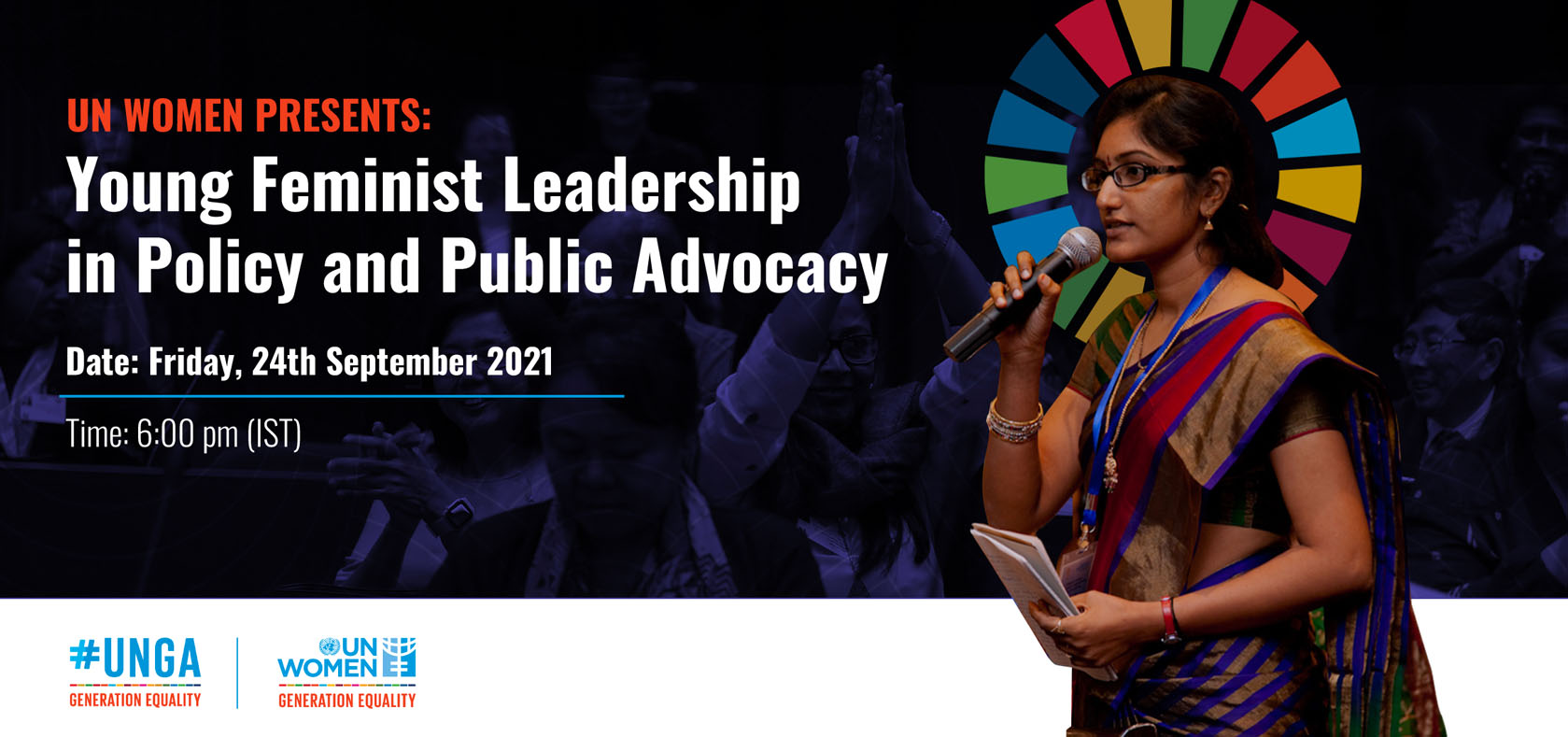Indian feminists call for inclusive and youth-led feminist policymaking at the 76th UN General Assembly
Date:

At a high-level event on the sidelines of the 76th UN General Assembly on 24 September, UN Women and India’s National Alliance of Women's Organisations (NAWO) committed to activate a youth-led feminist agenda that strengthens youth engagement in shaping public policy and in intergovernmental processes at the United Nations and beyond.
The event built upon the momentum of the Generation Equality Forum in July 2021, which placed youth and feminist movement-building at the heart of the five-year journey of the Generation Equality Action Coalitions and the Compact on Women, Peace and Security and Humanitarian Action. While young feminist advocacy has gained unparalleled momentum and support worldwide, hard-won gains for women’s rights are at risk of reversal in many parts of the world and young women and girls continue to be among the most marginalized and vulnerable populations. Speaking at the online event, UN Women Representative for India, Susan Ferguson, emphasized that: “The National Alliance of Women’s Organisations in India (NAWO-INDIA) and UN Women have committed to invest in building youth leadership and increasing their meaningful participation in intergovernmental processes and global agenda-setting platforms. We believe it is critical to build ownership and action by youth leaders for policy shifts and to set up monitoring processes to assess progress on global and national commitments for gender equality and women’s empowerment.”
Pam Rajput, internationally renowned activist and Vice President of NAWO, spoke about building the capacity of youth leaders so they have a say in policy-making: “This is the most opportune time. First, India has a huge young population; we’re slated to be the world’s youngest nation by 2030. Fifty per cent of that population is made up of diverse young women. It is time to invest in that population. Second, with the government focusing on women-led development, we must align our advocacy and activism and represent the young feminist perspective so that young people have a critical role to play in the nation-building process.”
UN Women National Young Gender Activist, Jeevika Shiv, shared the impact of the Generation Equality Forum and said, “The [1995] Beijing Platform for Action set the benchmark for the women’s movement. At the Generation Equality Forum [in 2021], feminists came together to understand the learnings” from the intervening 25 years, Shiv said, calling the Forum “a pivotal moment.”
“We asked ourselves questions of power and participation, and how we can best strengthen diverse feminist voices. The power of Generation Equality has been to bring the lived experiences of diverse people from the grassroots and centre the experiences of women in all their diversities.”
The panel highlighted that young women, young men and youth-led organisations, networks and movements have a critical role to play in bringing up new issues that feminists face today. It also underlined that collective strength, creativity and adaptability is vital to the sustainability of feminist advocacy.
The panellists set forth some recommendations to ensure that the voices of young women and girls are better reflected in the feminist discourse, globally and in India. These entail better access to resources and capacity-building opportunities for young feminists to meaningfully participate in intergovernmental and policy-making spaces; intergenerational alliances within the feminist movement; and adopting an intersectional and inclusive approach by intentionally creating platforms for the under-served.
Other panellists at the event included Jyotsna Siddharth, an artist and activist who leads Gender at Work in India; Prabhleen Tuteja, National Gender Youth Activist and Director of Programmes, Youth Parliament (YP) Foundation; and Aparna Uppaluri, Programme Officer, Ford Foundation, India. The session was moderated by UN Women Representative in India, Susan Jane Ferguson, and Hulda Atieno OUMA, Strategic Planning and Coordination Specialist from UN Women regional office in the Asia and the Pacific gave the closing remarks.
Related links
"It's time to invest in the 50%," says Pam Rajput, Vice President @NAWOorg at the 76th #UNGA on Young Feminist Leadership in Policy and Public Advocacy
— UN Women India (@unwomenindia) September 28, 2021
Side Event by @UN_Women 🇮🇳 #GenerationEquality pic.twitter.com/XMFYU9Iq7N
"We need to go beyond Dalit women being able to access basic amenities only, we need to give them resources, grants & scholarships so that they can dream of a life more than just basic"
— UN Women India (@unwomenindia) September 28, 2021
- @Jyotsnasmailbox, India Lead, @GenderatWorkInd #GenerationEquality https://t.co/fYOKeWuGE9